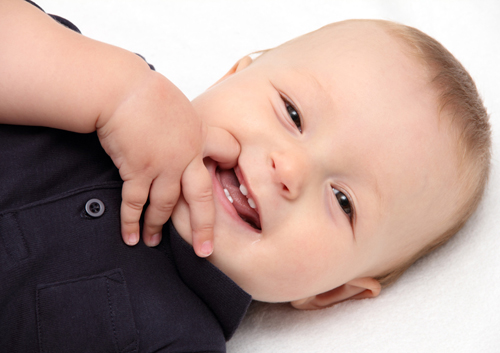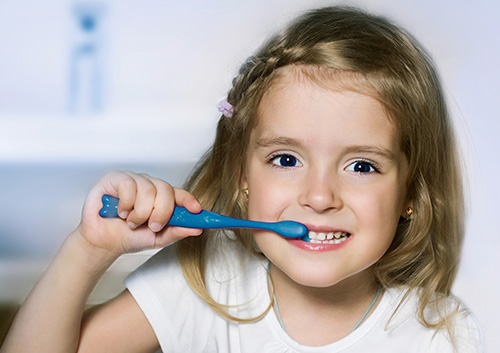July 12th, 2023

Children are born with a set of primary teeth – 20 to be exact – that help them learn to chew and speak, and develop enough space in the jaw for the permanent teeth that will appear several years later. Kids are especially susceptible to decay, which can cause pain and tooth loss – a problem that could interfere with oral development. As a parent, it is important that you take proactive steps to keep your child’s teeth as healthy as possible.
Bottles and “Sippie Cups”
One of the biggest culprits of childhood tooth decay is poor diet. This begins as early as a few months old, when children are often allowed to go to bed with bottles and “sippie cups” of milk or juice. The sugars in these beverages – even natural sugars – can steadily decay the teeth.
Dr. Irwin Seidman and our staff suggest serving children milk and juice only at meal times, and limiting juice intake to just a few ounces per day. If your child becomes thirsty between meals or likes to go to bed with a bottle, serve water during these times.
Hygiene
As a parent, you can establish healthy dental habits long before your child’s first tooth erupts. Start by gently wiping your baby’s gums with a clean wash cloth during the first months of life. By age one, graduate to an appropriately sized toothbrush with fluoridated toothpaste, and brush at least twice a day.
Dental Visits
Dental visits should start young and continue on a regular basis throughout your child's life. Dr. Irwin Seidman and our staff recommend parents bring their children to Palatine Pediatric Dentistry for the first time no later than the child’s first birthday. Initial visits concentrate on parental education, while later visits may include thorough cleanings and fluoride treatments as your child grows.
For more information about keeping your child’s teeth cavity-free, contact our Palatine, IL office to schedule a dental consultation and checkup.
July 12th, 2023

After hours of juggling a wailing baby, you’re probably desperate to address teething pain. If your baby is irritable, drooling, and chewing on hard objects, he or she is likely teething. Although some discomfort while your baby is teething is inevitable, learning a few basic approaches can ease painful gums and soothe your frazzled nerves.
- Offer your finger. Simply chewing on your nice, plump finger may be enough to ease your little one’s pain. Make sure you clean your finger before placing it in your baby’s mouth.
- Use a teething ring. A firm rubber teething ring allows your child to gnaw, and alleviates pain. If your baby seems to like sucking on a bottle, replace the milk or formula with water during teething periods. This reduces sugar intake and decreases the risk of tooth decay.
- Cool it down. Stick a clean, moist washcloth in the freezer (place it on a tray for cleanliness) and offer that to your baby. The cooler temperature of the chilled cloth eases the pain of teeth erupting through the gums. Soaking the washcloth in non-caffeinated tea, such as chamomile, may reduce inflammation associated with teething.
- Grab some hard foods. Certain foods allow your kiddo to gnaw, and can ease teething pain. For example, frozen bananas, large chunks of chilled carrots, an apple, or frozen bagels make good teething pain relievers. If you’re offering your child solid food, watch carefully to ensure that your infant doesn’t bite off a piece and choke.
- Try a natural remedy. Years of grandmotherly wisdom suggest that home remedies might help with teething. Try rubbing clove oil, peeled ginger root, or vanilla extract onto your child’s gums. Although there isn’t scientific evidence to prove these remedies are effective, they may help your little one through the painful teething process. Just remember to test the method out on your own gums first to ensure any tingling or numbing is bearable for your child.
- Use medications. If your baby seems to be especially uncomfortable, over-the-counter medications may be appropriate. Giving an age-appropriate dose of acetaminophen (Tylenol) or ibuprofen (Advil) may reduce discomfort. Make sure you check with your child’s pediatrician or our office first to ensure the medication is safe.
If nothing seems to be helping your child’s teething pain, you can always schedule an appointment with Dr. Irwin Seidman. Our team at Palatine Pediatric Dentistry understands the unique health needs of your little one, and are more than happy to help ensure he or she grows up with a beautiful smile.
For more information about teething, or to schedule an appointment with Dr. Irwin Seidman, please give us a call at our convenient Palatine, IL office today!
July 5th, 2023

First word, first step, first haircut, first… toothbrush? While it may not be considered a typical milestone, choosing the right first toothbrush is an important first step in your child’s future dental health.
The time to start brushing is when your baby’s first tooth appears. Until then, you have probably been using a clean, moist washcloth or gauze to carefully wipe your baby’s gums. Continue that gentle treatment with a toothbrush designed for infants. Look for a toothbrush designed especially for infants and toddlers, with extra-soft bristles and a small head for tiny mouths.
When your toddler is ready to try brushing for the first time, there are many options to make learning the proper technique enjoyable for both of you! Extra-soft bristles and small brush heads again are important for young children, and brushes are available with colorful patterns and designs to charm any child. There are brushes available with handles designed for easy gripping, right-handed and left-handed options, and even electric models.
No matter which brush you choose, Dr. Irwin Seidman and our team recommend:
- Use soft bristles and a brush head sized to fit your child
- Use the proper amount of toothpaste (when your child is old enough to spit out toothpaste instead of swallowing)
- Replace the toothbrush every three months, or earlier if it is frayed
- Always supervise your young child while he or she learns to brush
- Don’t forget to schedule checkups every six months at our Palatine, IL office!
You probably won’t be preserving your baby’s first toothbrush in your baby book, but teaching your child the proper way to brush with the right toothbrush can lead to a lifetime of dental health. And that’s a milestone to celebrate!
July 5th, 2023

The dog days of summer are upon us, and what better time for Dr. Irwin Seidman and our team to ask our patients about their summer!
Whether you visited our nation’s capital, went on a camping trip, or just stayed in Palatine, IL and relaxed, we want to know how you’re all spending your summer! Please feel free to share your summer plans and experiences with us below or on our Facebook page as summer rolls on!






 Website Powered by Sesame 24-7™
Website Powered by Sesame 24-7™